Chenedi in Ampezzo ladin, a delicious recipe typical of a poor but genuine cuisine.
Ingredients (serves 6)
5-6 thinly sliced stale bread rolls
wild herbs
150 g of ricotta cheese
3 eggs
4-5 spoons of flour
½ onion
butter and water
grated parmesan cheese
salt, pepper and nutmeg
The herbs are washed, boiled, chopped and browned in a pan with butter and finely chopped onion. In a bowl, combine the previously diced bread with herbs, eggs, ricotta cheese, a handful of parmesan cheese, flour, salt, pepper, nutmeg and a little water.
Mix all the ingredients well and form small balls of 4-5 cm in diameter with your hands, using some flour.
Boil salted water and pour in the dumplings, cook them for 15-20 minutes. Dress them with parmesan cheese and melted butter.
Note: As a variation, diced soft cheese and bacon can be used instead of cottage cheese. According to personal taste, they can also be cooked in broth.
Tradition in one dish.
Ingredients (serves 4)
For the filling:
400 g red beetroot
100 g yellow beetroot
200 g potatoes
15 g flour 00
1 teaspoon fine salt
1 pinch of nutmeg
For the pastry:
320 g flour 00
1 egg
180 ml water
1 pinch of salt
For the topping:
100 g butter
smoked ricotta or cheese (e.g. Parmesan)
poppy seeds
Prepare the filling in advance, even the night before so that it is cold and firm. Steam the red and yellow beetroot and the potatoes separately. Blend the former, and mash the potatoes with a potato masher. Mix everything together.
Toast the flour for the filling in a frying pan so that it is golden brown and add it to the cold potato and turnip mixture. Season with salt and nutmeg, then leave to rest until it is time to make the casunziei.
For the pastry, add the egg to the flour, mix and add the salt and water, a little at a time, until the dough is soft and workable. Knead on a pastry board and form into a ball, which you leave to rest covered for about half an hour. Roll out the dough sheet thinly, so that your hand can be seen through, flour it and cut out disks with a 5-7 cm pastry cutter. Place a small spoonful of filling on each disc and close to form a half-moon, sealing the edges well. Dust a tray with flour, preferably semolina flour, and place the casunziei on it.
Once the preparation is complete, bring a large pot of water to the boil and place the butter in a saucepan to be heated. Gently immerse the casunziei in the salted water to simmer and cook for 5-6 minutes. Meanwhile, bring the butter to a hazelnut colour.
Drain them with the help of a slotted spoon, place them on plates, sprinkle with smoked ricotta or Parmesan cheese, drizzle with butter and finish with poppy seeds. Serve immediately.
Note: This filling is a winter classic, but in summer you can make them with green herbs or potatoes. If you want to give the filling an extra aroma, you can add a pinch of cinnamon, and maybe some sage leaves to the butter before heating it up.
One of the great mountain classics.
Ingredients (serves 4)
150 g boiled spinach
120 ml water
3 eggs
450 g flour 00
1 pinch of salt
Nutmeg
Butter and sage
Parmesan cheese
Place the spinach, water, eggs, flour, some grated nutmeg and salt in a blender glass. Blend thoroughly, obtaining a smooth and dense mixture.
Bring a pot of water to the boil, on which you will place the spätzle tool, and gently heat the butter with the sage in a small saucepan. When the water comes to the boil, add salt, pour the spätzle mixture into the spätzle pot and gently move it back and forth, cutting the dough that drips into the pot through the holes (alternatively, cut the dough into small pieces like for gnocchi).
Let them simmer for a few minutes from when they rise to the surface, drain well with a skimmer and serve with the flavoured butter and a generous sprinkling of Parmesan cheese.
A dessert that shows the roots of the Ampezzo tradition, divided between Italy and Tyrol.
Ingredients (serves 4)
2 Eggs
250 g Milk
30 g Sugar
125 g Flour
1 Apple
Jam
Make the batter by beating eggs, milk and flour. Add the chopped apple. Cook the batter in a hot pan greased with oil or butter.
Turn the omelette over and cook on the other side. Cut the omelette into squares in the pan and sprinkle with caster sugar.
Serve the omelette sprinkled with icing sugar and accompanied by jam to taste.
Sweet focaccia from the Ampezzo festivities.
A braid sprinkled with sugar grains composed in a circle with a hole in the middle, just like a hug. It was the wedding invitation cake: the bride and groom went personally to make the invitations to each of their guests. It was customary on this occasion to bring a brazorà with 5 carafoi (crostoli) and 5 sugared almonds in the middle.
Ingredients
500 g flour
80 g sugar
80 g butter
5 eggs
1 grated lemon
1 sachet vanillin
16 g dried brewer’s yeast
80 g milk
Salt to taste
Granulated sugar to decorate
Combine all the ingredients in a bowl and add the yeast dissolved in a little warm milk. Knead the mixture for about half an hour and let it rest for another half an hour near a heat source.
Divide the dough into three parts and form a doughnut-shaped plait. Let it rest for another half an hour. Brush the doughnut with egg yolk mixed with water and sprinkle with granulated sugar.
Bake at 170 degrees for 40 minutes.
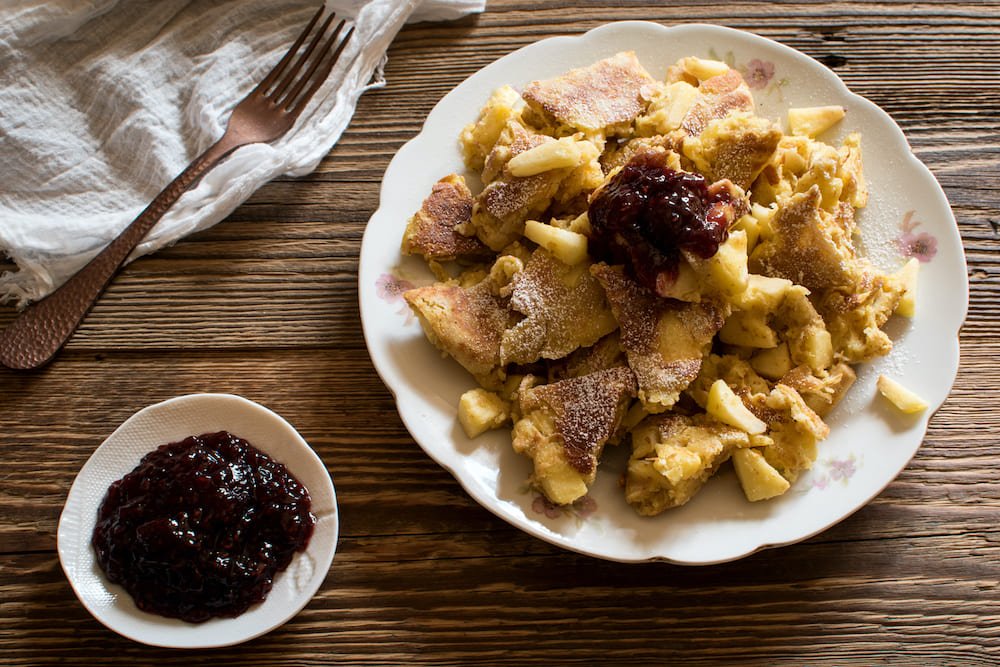
This sensational dessert has always filled Ampezzo’s palates, as simple and straightforward as all flavours that endure through time and tradition.
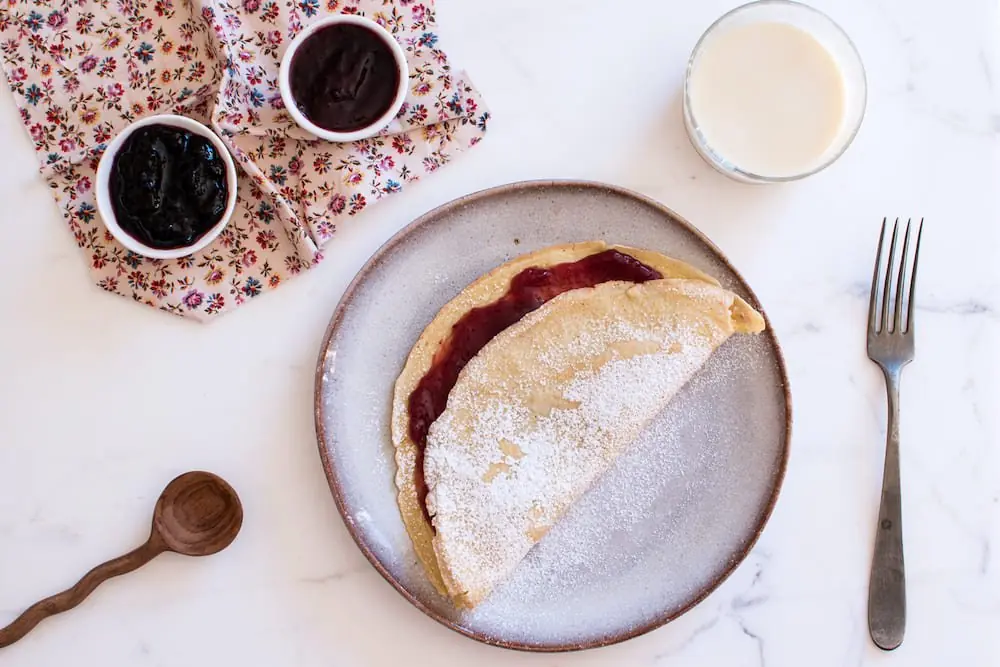
What we call omelettes are actually sweet crepes, which get an Alpine touch with the use of cranberry jam, a traditional product of Ampezzo families.
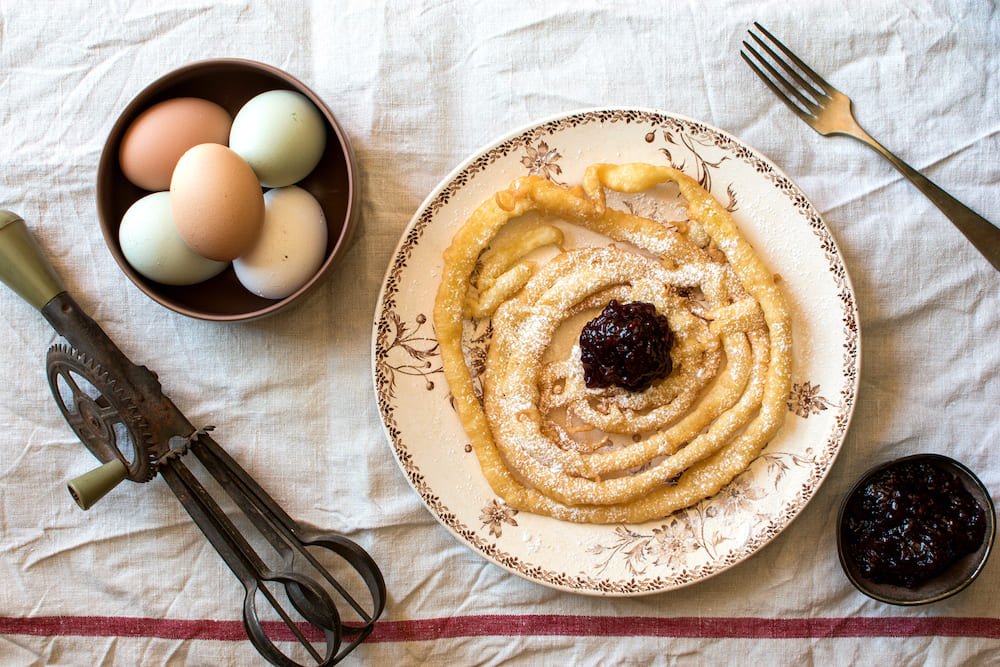
Unique and unobtainable dessert beyond the Ampezzo borders, with a simplicity that conceals notes of infinite delicacy.
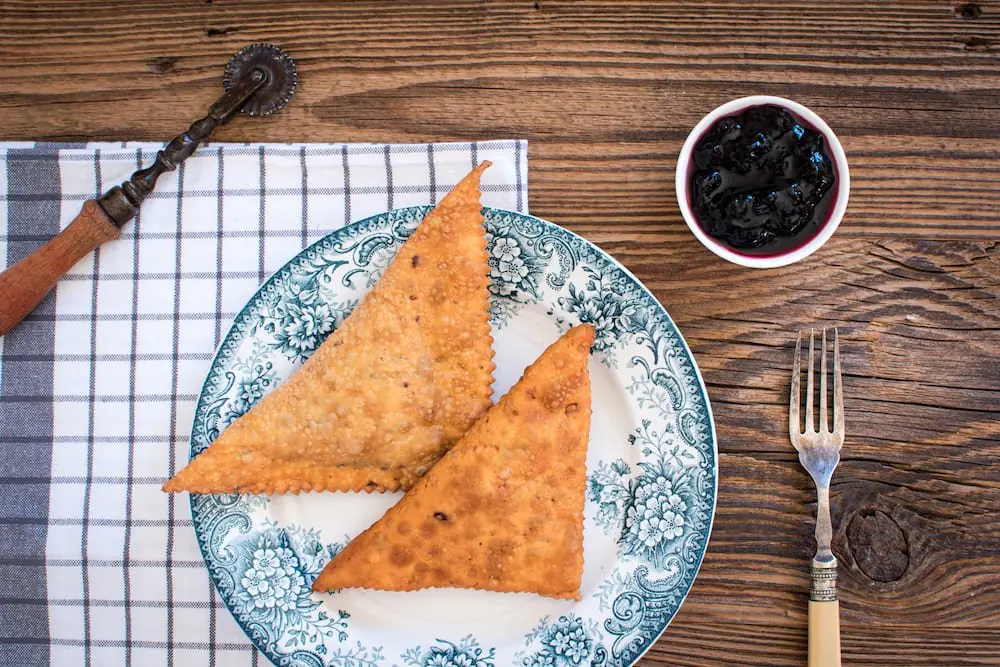
A delicacy that certifies the Cortina tradition in continuous exchange with the Tyrolean one. The crisp and sweet dough, contrasting with the slightly tart currant jam, make the tirtl a unique and unmissable dessert!
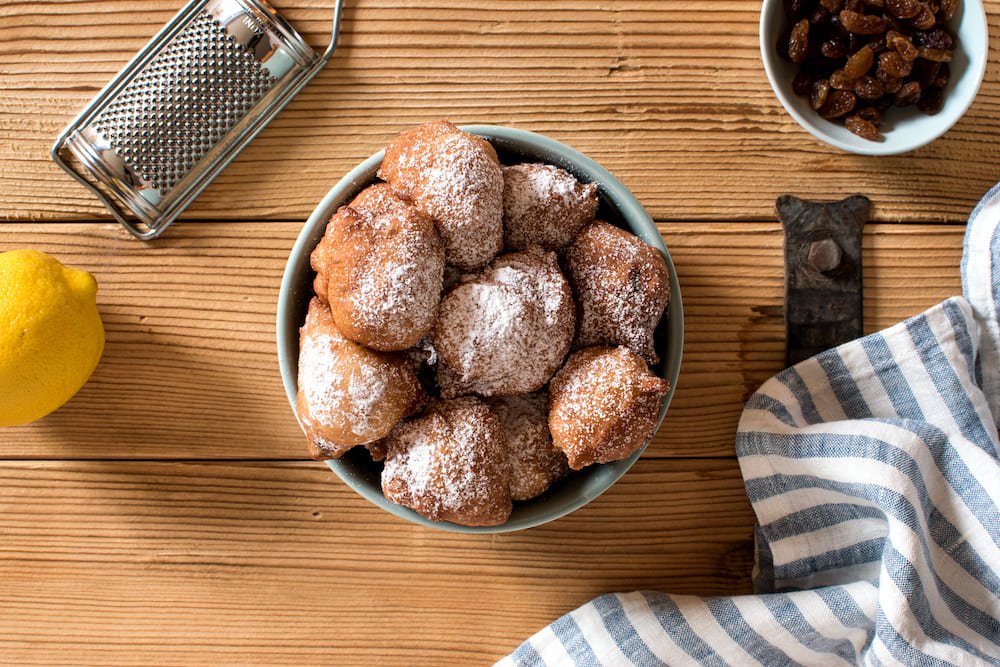
Nighele, a typical fritter, usually a great classic of the Ampezzo Carnival and attributable to the Azon district. A real treat.
The Veneto liqueur with egg cream, to be tried hot, at room temperature or cold.
Ingredients (for 2 x 1.5 l bottles)
1 litre fresh milk
800 g sugar
1 vanilla pod
10 egg yolks
200 ml dry fortified wine, such as Marsala
200 ml pure alcohol
Heat the milk with the sugar and the opened vanilla pod in a high saucepan. Simmer until the sugar is completely dissolved, then leave to cool.
Lightly beat the egg yolks in a bowl, then add the dry liqueur wine and the alcohol, without stopping stirring with the whisk. Combine the two mixtures, remove the vanilla and whisk quickly to prevent lumps from forming.
Store in a cool, dark place, beating the bottles vigorously once a day. It can be consumed after about 10 days, then stored in the refrigerator.
Note: If you want to enjoy it in a typical winter drink, the Calimero, combine 1/3 of boiling espresso coffee, 1/3 of hot vov, 1 tablespoon of dark rum, stir and put into cups. Top with plenty of whipped cream, a sprinkling of cocoa and serve.
One of the most famous drinks with 40% alcohol content, made from berries, fruits or herbs.
Grappa is a fragrant digestive suitable for any occasion, to be consumed at home, in typical wine bars and trendy cafés, or at mountain farms and mountain huts: the options are endless, both in the city and in the high mountains.
Sipping a small glass of homemade grappa on the slopes, for après ski or after a good traditional lunch as a digestif, is a well-established trend in Cortina d’Ampezzo, to enjoy your stay right down to the last sip.
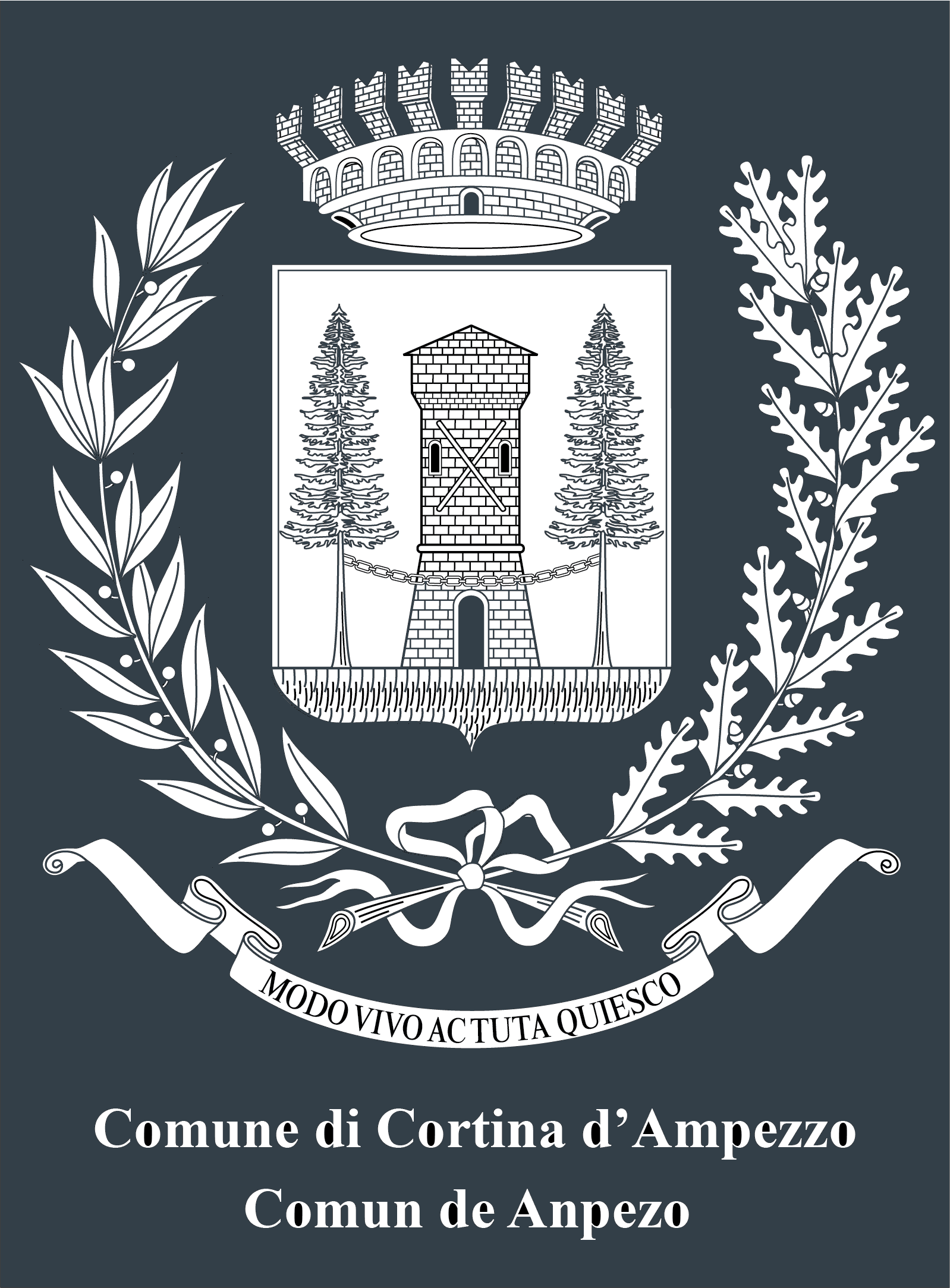




Head Office: Loc. Sacus 4, 32043 Cortina d’Ampezzo (BL) – P.I. 00806650255 | Privacy Policy – Cookie Policy
A partire da giovedì 4 dicembre, ogni famiglia residente a Cortina potrà ritirare gratuitamente la bandiera con il nuovo emblema presso lo IAT di Piazza Roma.
Vivi la storia — sogna Milano‑Cortina.